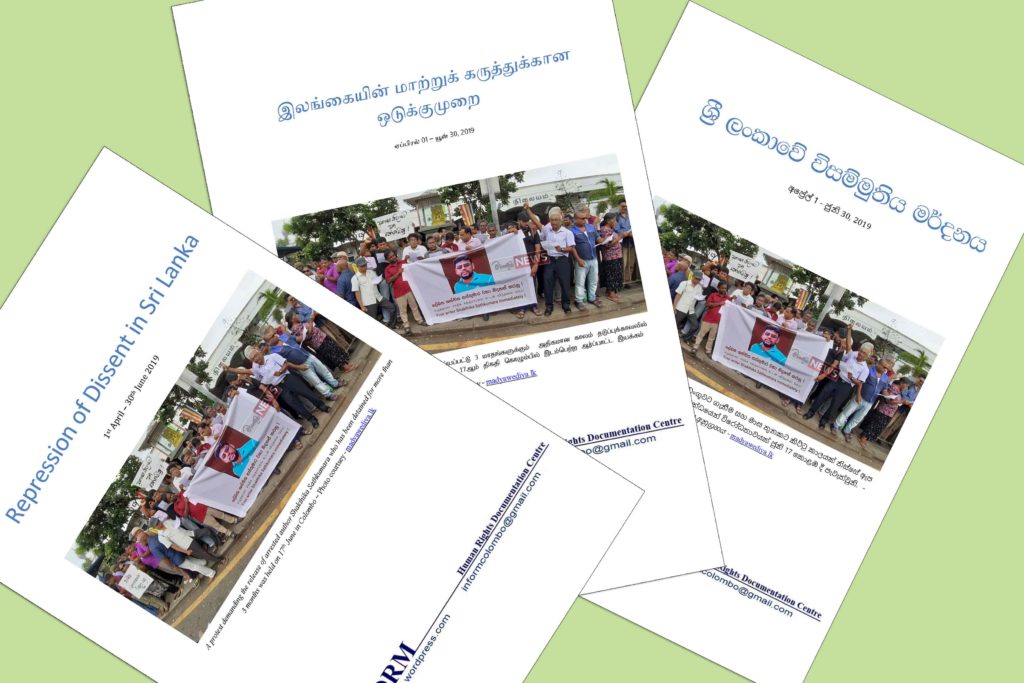
Download full report here: English, සිංහල தமிழ்
Executive Summary
On 21st April 2019 a series of bomb attacks targeted 3 churches in Colombo and Batticaloa, and 3 major tourist hotels in Colombo, by an Islamic terrorist group. According to the government reports, 253 persons were killed by the bomb attacks. Following this incident, countrywide emergency regulations were declared. In this context, islamophobic and ethnonationalist groups received much popularity and acceptance journalists and artists who talked about reprisals faced by Muslims in aftermath of Easter Sunday bombings, were systematically targeted by hate speech in social media. At least 3 journalists were reported to have been arrested on suspicion of terrorism related offences while doing their job and while they are at their homes, and later released on bail.
Also the repression of writers who dissented against Buddhist nationalism – a trend which could be observed since several years – was intensified during these 3 months. A Sinhalese writer was arrested for writing a short-story critical of Buddhism, a journalist was about to be arrested after writing an article about ‘Sinhala-Buddhist violence’ following Easter-Sunday attacks. Also legal action was taken against an owner of Media Company for allegedly “insulting Buddhism and spreading hatred”, after conducting a speech at book launch event. Also a complaint was made against a human rights defender who requested the Police to conduct an investigation into hate speech comments made by another senior Buddhist monk at a public event. Most of these incidents were related to complaints made by the Buddhist Information centre – a radical group of Buddhist monks who were publicly known since they disrupted a meeting of families of disappeared in 2013.
The repression of dissent in the North-East was observed during this period, as well as a continuous pattern for several years. Tamil students organizing memorial events for end of the war were threatened. It was reported that a journalist who went to report on the implementation of a court order issued regarding a controversial Buddhist temple had been assaulted by a Police officer. Another journalist exposing intimidation by intelligence agents during a protest by families of the disappeared was also arrested. Further the office of a civil society organization in the North and East was raided by the military. Though nothing suspicious has been found, military had verbally abused the staff of the organization. A Tamil anti-disappearance activist who was very involved in a long term protest by families of disappeared was interrogated. Those protesting against land acquisition by a factory were also arrested and an anti- disappearance activist was subjected to interrogation.
Even simple forms of expression, such as dress, photography in [public places led to arrest while police tried to stop raising of black flags to express those killed in Easter Sunday bombings.
Further discriminated and vulnerable communities especially LGBTIQ community, refugees and asylum seekers, and Muslim women became further targets of discrimination and harassment. The annual pride event by a LGBTIQ organization faced difficulties. Aftermath of Easter-Sunday bomb attacks, refugees were forced to leave their shelters, and some of them were threatened and attacked by the mobs. The organizations working with refugees also faced increased surveillance, and searches by the military and police while a human rights defender supporting and protecting refugees faced assault and threats of assault. After a face cover ban (including ban of hijab and niqab) was imposed under emergency laws, Muslim women including those who do not wear banned clothes were harassed at public places, emergency laws were discriminatively used. Sri Lanka human rights commission made number of interventions into this[1]. In another case a Police officer related CID was threatened at a magistrate court by a Buddhist monk – a Member of Parliament for not supporting an act of ethnic profiling against a Muslim medical doctor. In this case the Muslim medical doctor was arrested after a nationalist newspaper published an article accusing him of sterilizing Sinhala women without their consent during Cesarean section delivery surgeries he had conducted. Also he was accused of earning assets via illegal or dubious means. After investigations, Criminal Investigation Division (CID) informed the courts that there are no evidence against these allegations[2].
Also media reported that an investigation was started by the Police against those who organized a labour strike on railways. Under ‘emergency regulations’, labour strikes were relating to a wide range of services, and industries including tea, coconut, rubber, textile were banned. Another trend is the misuse of No 54 of 2007 – International Covenant on Civil and Political Rights (ICCPR) Act to suppress freedom of expression of the writers, journalists and civilians. Also the Prime Minister several times stated that Counter Terrorism Act which was previously temporarily withdrawn by the government due to the strong opposition from the civil society, opposition political parties, and media organizations will be brought again.
Following the Easter-Sunday attacks, long term human rights struggles became difficult to sustain and became less visible. . As freedom of assembly could be restricted under emergency regulations, activists and civil society organizations faced difficulties in getting organized and having public support for protests. The importance of security prioritized state was increasingly highlighted by the media and public discourse. Subsequently the focus on human rights became less important. This situation may have a long-term negative impact on the human rights situation in Sri Lanka.
Coverage of the Incidents
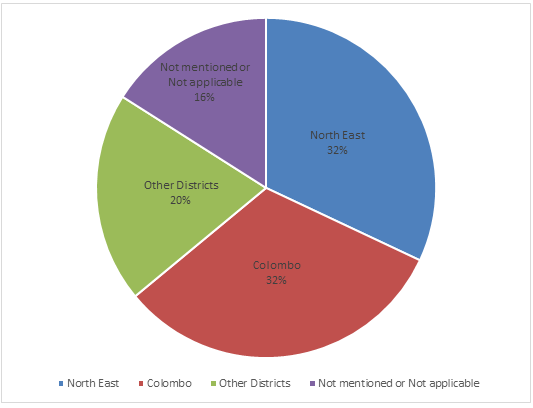
When geographical coverage of the incidents included in the report are considered, the highest percentage (32%) of incidents from a single district is reported from the Colombo District. Another 32% of incidents are reported from the North and East. These include 3 incidents from Jaffna, 1 from Mannar, 1 from Vavuniya, 2 from Mullaitivu and 1 from Batticaloa districts. Only 20% of the incidents are reported from other districts. These include 2 incidents from Gampaha district, 1 each from Ratnapura, Anuradhapura and Kurunegala districts. In one incident, we were unable to find the district of the incident. As repressive laws impact could impact nationally, their geographical location was considered not applicable. When compared with previous quarters, significant growth of incidents reported outside North and East could be observed in this quarter.
Out of 25 incidents, only one incident was exclusively related to a female victim. 12 incidents were related to male victims. While in other incidents, gender of the victims was either not mentioned or inapplicable as affected parties were groups, organizations etc.
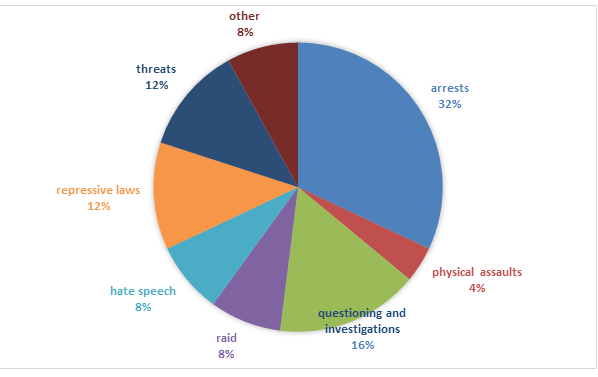
The majority of the incidents- 32% are arrests of dissenters. 16% are related to ongoing investigations and questioning of dissenters by security forces and Police. 12% were verbal threats. 8% were related to raids and searches of human rights organizations. Another 8% of incidents were related to hate speech. 12% of incidents were related to repressive laws. There was one incident (4%) relating to a physical assault.
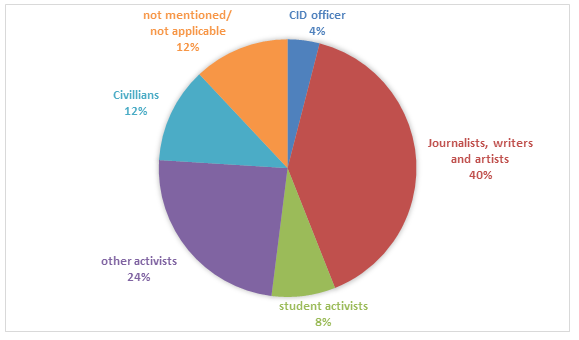
The majority of incidents – 40% were related to the repression of journalists, writers and artists. 8% of incidents were related to repression of student activists. 1 incident was related to a threat made against a Police officer. 24% of incidents were related to other activists and12% were related repression of rights and freedoms of other civilians. Other civilians meant protestors against a mining company, three youth arrested for photographing Vesak celebrations, and civilians who were banned of hoisting black flags.
[1] These incidents of discrimination and harassment faced by Muslim Women and other Muslims are not covered in this report). Further details about interventions of HRCSL could be accessed in following links.
- Letter written by HRCSL to Sri Lanka Bar Association on discriminatory practices of lawyers http://hrcsl.lk/english/wp-content/uploads/2019/06/HRCSL-letter-to-Bar-Association-of-Sri-Lanka.pdf
- HRCSL writes to Ministry of Public Administration on recent circular on dress code http://hrcsl.lk/english/2019/06/04/hrcsl-writes-to-ministry-of-public-administration-on-recent-circular-on-dress-code/
- HRCSL writes to chairman, university grants commission on need to ensure non-discrimination in institutions of higher education http://hrcsl.lk/english/2019/05/25/hrcsl-writes-to-chairman-university-grants-commission-on-need-to-ensure-non-discrimination-in-institutions-of-higher-education/
- HRCSL writes to Chambers of Commerce requesting non-discrimination in enforcing security measures. http://hrcsl.lk/english/2019/05/24/hrcsl-writes-to-chambers-of-commerce-requesting-non-discrimination-in-enforcing-security-measures/
- HRCSL writes to public authorities calling for non-discrimination in enforcing security measures. http://hrcsl.lk/english/2019/05/24/hrcsl-writes-to-public-authorities-calling-for-non-discrimination-in-enforcing-security-measures/
[2] CID informs Court no evidence found for all allegations against Dr. Shafi Shihabdeen http://www.ft.lk/front-page/CID-informs-Court-no-evidence-found-for-all-allegations-against-Dr–Shafi-Shihabdeen/44-680838 accessed on 20th August 2019

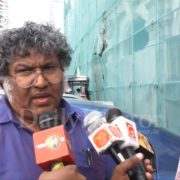
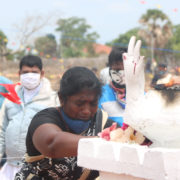
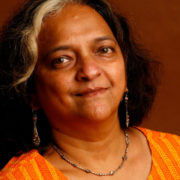
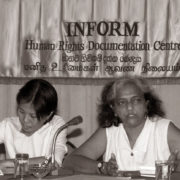
Comments